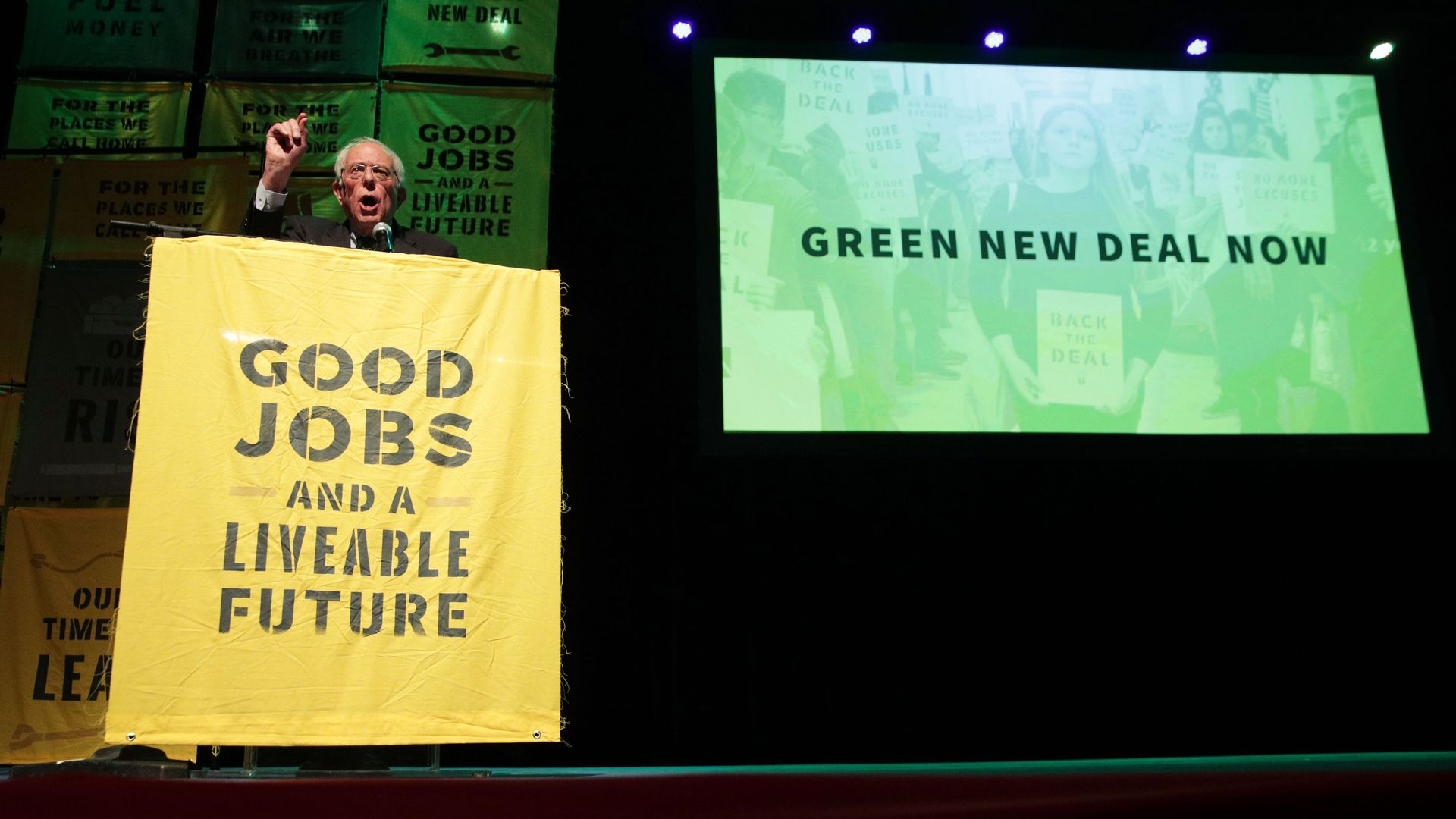Where top 2020 candidates stand on climate policy and the Green New Deal
Add Axios as your preferred source to
see more of our stories on Google.

Sen. Bernie Sanders (I-VT) at a rally May 13. Photo: Alex Wong/Getty Images
The Green New Deal resolution, introduced in February by Rep. Alexandria Ocasio-Cortez (D-N.Y.) and Sen. Ed Markey (D-Mass.), has helped cement climate change as a real topic in the 2020 presidential race.
What's happening: More Democratic candidates have pitched climate change policy that goes beyond the Green New Deal, largely to prepare for events like CNN's "climate crisis" town hall. The GND — which is more of a call to arms than a strict policy proposal — outlines a 10-year mobilization plan to move the country toward a 100% carbon-free power system and a decarbonized economy.
Climate policy from GND co-sponsors
- Sen. Bernie Sanders: His $16.3 trillion plan to tackle climate change frequently touts the Green New Deal as the driving force behind restructuring how the U.S. consumes energy. His plan references the GND more than other co-sponsors' plans.
- Sanders wants to invest $200 billion in the United Nation's Green Climate Fund for developing countries and create a $40 billion Climate Justice Resiliency fund.
- Sen. Elizabeth Warren: She has multiple climate plans, the latest of which pledges $3 trillion to purchase clean energy products for federal buildings and to invest in zero-emission vehicles and decarbonize other means of transit.
- She endorsed a carbon tax at CNN "climate crisis" town hall.
- Sen. Amy Klobuchar: Her plan includes a $1 trillion investment to upgrade the U.S. energy infrastructure and promote "green economy" jobs, with a focus on rural areas. She also wants to strengthen tax incentives for climate research.
Climate policy from GND supporters
- Former Vice President Joe Biden: His plan would invest more than $5 trillion over 10 years and calls for conserving 30% of America’s land and water by 2030, seeking a G20 commitment to end export finance subsidies of high-carbon projects, reducing U.S. buildings' carbon footprint by 50% by 2035, and reaching net-zero emissions by 2050. Biden supports a carbon tax, and doesn't think a federal push to ban fracking is realistic.
- Former tech executive Andrew Yang: His plan would invest $4.87 trillion over 20 years, which includes "pre-disaster mitigation grants for high-risk hurricane communities," combating wildfires, establishing a Climate Change Adaptation Institute, and investing in geoengineering research. Yang also wants to incentivize divestment in oil companies.
- Mayor Pete Buttigieg: His plan would put at least $550 billion into 3 investment funds: a "Clean Energy Bank" to fund local clean energy projects, a "Global Investment Initiative" for clean energy and infrastructure projects and to "counter China's Belt and Road initiative," and a "Cleantech Fund" to bankroll "demonstration projects."
- Buttigieg would also put $200 billion toward job training for workers displaced from fossil fuel companies.
- Billionaire Tom Steyer: He wants the planet to reach net-zero carbon emissions by 2045, require all new parking structures to charge electric vehicles by 2022, invest $375 billion to decarbonize buildings, put $650 billion into clean-energy transit, and ban fracking, mining and drilling on public lands.
Climate policy from GND opposers:
- President Trump: His administration has completed 58 environmental policy roll backs, per the NYT, including: lowering regulation requirements of major industrial polluters via the Clean Air Act and loosening offshore drilling safety regulations implemented after the Deepwater Horizon oil spill.
- Trump has a history of climate change skepticism and disagrees with findings on human-caused climate change from his own administration.
- Former New York City Mayor Michael Bloomberg: His plan calls for 80% of electricity-generation in the U.S. to come from clean sources, allocating $25 billion per year to research clean energy, reversing Trump's policy rollbacks, and banning new fossil fuel leases on federal lands.
- Bloomberg does not support the Green New Deal, deeming the cost too great. He does not believe it would pass the Senate in the next two years, a campaign spokesperson confirmed to Axios. "His focus is on plans that are practical and achievable," they said.
Go deeper:
- What you need to know from CNN's "climate crisis" town hall
- 2020 presidential election: Track which candidates are running
- Key points from the Green New Deal
Editor's note: This story has been updated with more policy information. Cory Booker, Kamala Harris, Beto O'Rourke, Julián Castro, Kirsten Gillibrand, Marianne Williamson and Jay Inslee have been removed after dropping out of the 2020 race.

